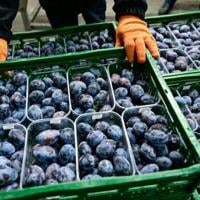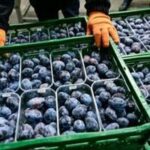In a warehouse north of Moldova’s capital, farmer Stefan Bitlan inspects boxes of plums soon heading to Germany as he has turned to exporting to the EU rather than Russia.
“There are a lot of challenges, but, yes, we chose the European Union,” said the 35-year-old, one of the largest plum exporters in the country of 2.6 million that lies wedged between war-torn Ukraine and EU member Romania.
The former Soviet republic on Sunday is holding a referendum on joining the EU — a move pushed by President Maia Sandu, who is also seeking re-election on the same day.
In 2023, Moldova — whose fruit industry used to depend on Russia — became the number one plum exporter to the European Union, with Sandu making the plum harvest a symbol of the success of the European shift.
After Moscow invaded Ukraine, Sandu, elected in 2020, cut ties with Russia and applied for EU membership, describing it as a matter of survival for one of Europe’s poorest countries.
– ‘Tough decision’ –
Accession talks began in June, but even before that Moldovans started to seek closer cooperation with the EU.
In 2022, plums were also among seven Moldovan agricultural products for which the EU has temporarily dropped customs duties to help the country in the face of the war in neighbouring Ukraine.
Of the record 150,000 tons produced in the country in 2023, the European Union imported 60,000 tons, representing a quarter of the total sold in the bloc.
Fresh, dried or stuffed with nuts and described as “the best in the world” by Moldova’s Prime Minister Dorin Recean, plums brought in 35 euro million ($38 million) to Moldovan producers last year.
Farmer Bitlan handled more than 10 percent of the Moldovan plum exports to the EU in 2023, buying fruit from other local producers in addition to his own.
With a 40-hectare orchard, most of it plum trees, Bitlan made his choice years ago, starting to export to the EU in 2014.
With that, he turned away from Russia, whose past restrictions on Moldovan fruits and vegetables left farmers in a “difficult darkness”, though it was a “tough decision” because of the many conditions and certifications that come with exporting to the EU.
But in the last five years his sales revenues have increased tenfold.
“In sales to the EU, everything is calculated to the millimetre, to 0.01 cents, and if you have quality goods you can’t go wrong,” Bitlan told AFP as he touched some of the plums to make sure they were not too soft or bruised at the warehouse in Drasliceni, about half an hour north of the capital Chisinau.
– ‘EU orchard’ –
Plum producers are not the only ones benefitting from getting closer to the European Union market.
Almost two thirds of the Moldovan exports go to the EU, and the total value has doubled in the last 10 years.
Moldova is now exporting fruit to around 50 countries, and three quarters of business owners are in favour of EU integration, according to a recent survey.
Moldovan exports to Russia — which in the past imposed several trade embargoes to penalise Moldova for seeking closer EU ties — dropped to 3.6 percent last year, down from more than 60 percent at the end of the 1990s, according to economist Veaceslav Ionita.
“If ever we have someone to thank for integrating us into the European Union, it will be (Russian President Vladimir) Putin,” said Ionita, who has described plums as “the hero of the year” in 2023.
Ahead of the upcoming election and referendum, pro-Russian parties have protested the turn toward Europe.
In September, a group of protesters carried a coffin filled with cabbage, grapes and apples to the agriculture ministry, saying the government’s pro-EU stance spelled the death of Moldovan agriculture.
But for Iurie Fala, executive director of Moldova Fruct, an association of fruit producers and exporters, EU integration “will bring prosperity and stability”.
“We want to become an orchard of the European Union,” he told AFP.
ani/jza/giv





